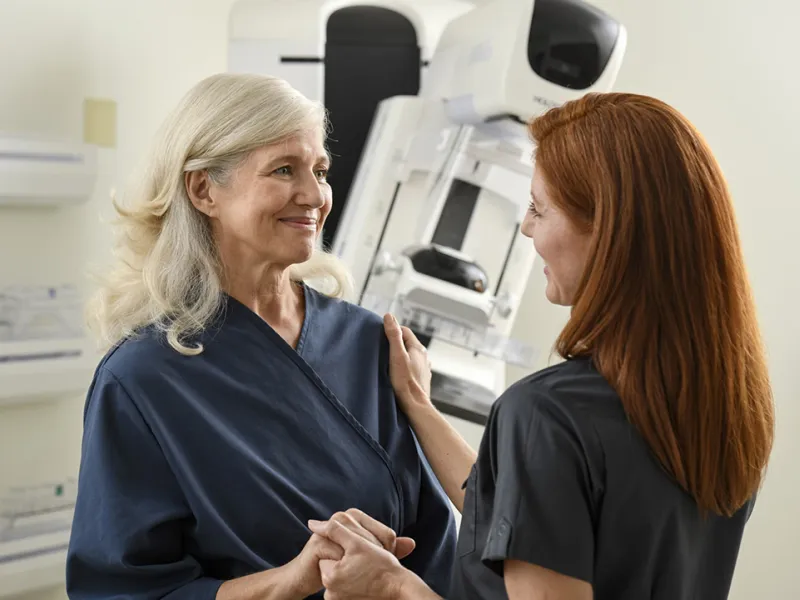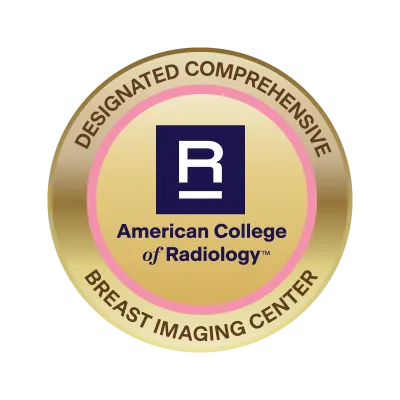
Personalized, Compassionate Breast Care
With all of life’s distractions, making time for your health can be challenging. That’s why we make it easy to get your routine mammogram and offer convenient access to a full range of breast imaging and screening services. It’s why we stay at the forefront of breast health with advanced technologies and techniques. And why we customize every person’s breast care to meet their unique goals and needs.
At AdventHealth Parker, we’re committed to saving lives with the early detection of breast cancer. And if the unthinkable happens, we’re here to provide hope and support when it matters most.
We’re here to help you find the right breast care specialist or a location that’s convenient for you.
Colorado Breast Care Made Convenient for You
- Breast Cancer Surgical Care and Support
-
A breast cancer diagnosis is understandably frightening and overwhelming. And that’s where we come in. Our breast care team partners with you to create a personalized surgical treatment plan specific to you, so you can know your next steps and feel informed and supported.
Surgical services may involve procedures to:
- Identify genetic susceptibilities, including BRCA 1 and 2 and strong family history
- Identify whether cancer has spread to your lymph nodes
- Manage high-risk breast lesions
- Offer hidden scar technique and nipple-sparing mastectomy
- Perform oncoplastic breast surgery
- Reconstruct your breast
- Relieve your symptoms
- Remove as much cancer as possible through a partial mastectomy (lumpectomy), full mastectomy or radical mastectomy
- Treat benign and malignant conditions
We utilize the latest technologies and advances including wire-free cancer localization and Enhanced Recovery After Surgery (ERAS) protocols to decrease opioid use, pain, nausea and length of stay. We also offer breast surgery preparation classes to prepare you for surgery and teach you how to care for yourself (or a loved one) after surgery.
- Survivorship
-
We’re here to help you continue your journey to whole health. The cancer survivorship program at AdventHealth Parker will help you continue healing your body, mind and spirit through important tools and resources, support groups and care coordination. Contact Kathy Creecy, Katherine.Creecy@AdventHealth.com for our support group offerings and other survivorship seminars.
- High-Risk Breast Cancer
-
The high-risk breast program at AdventHealth Parker, called GRACE: Genomics & Risk Assessment for Cancer Early Detection Program, provides specialized care for individuals with an increased risk of breast cancer due to family history or specific breast cancer risk factors.
Risk factors for breast cancer include:
- Chest radiation treatment before age 30
- Dense breast tissue
- Family history of breast, ovarian or pancreatic cancer or a family member diagnosed before age 50
Inherited gene mutations associated with increased cancer risks such as BRCA1 and BRCA2
Contact our Genetic Counselor Manager, Melissa Gilstrap, MS, CGC at melissa.gilstrap@AdventHealth.com for more information.
- Chest radiation treatment before age 30
- Cardio-Oncology
-
Cardio-oncology helps diagnose and treat cardiovascular problems that occur in those who have cancer. Often, people who have cancer have other heart disease risk factors. That’s why multidisciplinary collaboration is vital and why our cardio-oncology team works hand in hand with the rest of your care team to provide personalized support.
We monitor your whole health even before you start cancer treatment by assessing your cardiovascular risk, using imaging and diagnostic tests to find existing heart or blood vessel problems. We also work to detect any new heart problems early while you’re undergoing treatment.
- Genetic Counseling to Help You Understand Your Risk Factors
-
Your genes tell the story of you — and your health, including your risk of breast cancer. Because we recognize the importance of giving you a clear picture of your risks, we’ll help you understand your health through advanced genetic counseling and testing services.
Genetic counseling is the first step. In a counseling session, you and a genetic counselor can discuss your family history, personal history, symptoms you may have and other factors. With this information, your counselor can define your possible health risks, including your risk of breast cancer.
We’ll work with you every step of the way to understand what your results mean for you and your family, as well as any important recommendations for prevention or further testing.
Contact our Genetic Counselor Manager, Melissa Gilstrap, MS, CGC at melissa.gilstrap@AdventHealth.com to learn more.
- Extra Support for Patients and Their Loved Ones
-
We know that a cancer diagnosis changes your life — and the lives of your loved ones, too. Your Nurse Navigator, a trained registered nurse, is ready to help you find the support you need, and will answer your questions, assist with appointments and ease your mind.
Some of our offerings may include:
- Individual and family counseling
- Look Good Feel Better program to help you cope with changes in your appearance
- Weekly and monthly support groups to talk through topics ranging from chemotherapy to nutrition
Our Experts, Dedicated to Your Care

Christine Denise Rogness, MD
Breast Program Director

Nadine Mikhaeel, MD
Medical Director, Medical Oncology

Andrew Tanner, MD
Medical Director, Radiation Oncology

Tina Donnelly, RN, BSN
Breast Navigator

Melissa Gilstrap, MS, CGC
Genetic Counselor Manager
Understanding the Types of Breast Cancer
- Colloid Breast Cancer
-
Mucinous carcinoma of the breast — sometimes called colloid carcinoma — is a rare form of cancer that begins in the milk duct and can spread to nearby healthy tissue. This invasive ductal carcinoma is composed of abnormal cells that “float” in pools of mucin, a key component of the slimy, slippery substance known as mucus.
Typically, mucus lines most of the inner surface of our bodies, such as our digestive tract, lungs, liver and other vital organs. Many types of cancer cells — including most breast cancer cells — produce some mucus. In mucinous carcinoma, however, mucin becomes part of the tumor and surrounds the breast cancer cells.
Research suggests that only about 2-3% of invasive breast cancers are “pure” mucinous carcinomas — meaning that this is the only type of cancer present within the tumor. Mucinous tumor cells tend to behave less aggressively than more typical kinds of invasive ductal cancer. About 5% of invasive breast cancers appear to have a mucinous component within them, with other types of cancer cells present as well. Mucinous carcinoma is extremely rare in men.
Symptoms
Like other types of breast cancer, mucinous carcinoma of the breast may not cause any symptoms in its early stages. Over time, a lump may grow large enough to be felt during breast self-exam or examination by a doctor. Diagnosing mucinous carcinoma requires a skilled professional and can be detected by mammogram, ultrasound, MRI or biopsy.
Risk Factors
Although mucinous carcinoma can be diagnosed at any age, women who’ve gone through menopause tend to be affected most often. Some studies have found that the average age at diagnosis is in the 60s or early 70s.
- Ductal Carcinoma Breast Cancer
-
Beginning in the lining of the milk ducts (thin tubes that carry milk from the lobules of the breast to the nipple), ductal carcinoma is the most common type of breast cancer. Ductal carcinoma may be either ductal carcinoma in situ (DCIS) or invasive ductal carcinoma.
DCIS is a noninvasive condition in which abnormal cells are found in the lining of a breast duct and have not spread outside the duct to other tissues in the breast. In certain instances, DCIS may become invasive cancer, meaning the cancer cells spread outside the breast duct to surrounding normal tissue. It can also spread to other parts of the body through the blood and lymph systems.
Symptoms
DCIS doesn't typically have any signs or symptoms. However, DCIS can sometimes cause signs such as a breast lump or bloody nipple discharge. DCIS is usually found on a mammogram and appears as small clusters of calcifications that have irregular shapes and sizes.
Invasive ductal carcinoma may not cause any symptoms at first. Often, an abnormal area turns up on a screening mammogram. In some cases, the first sign of invasive ductal carcinoma is a new lump or mass in the breast that you or your doctor can feel.
Any of the following unusual changes in the breast can be a first sign of breast cancer, including invasive ductal carcinoma:
- A lump in the underarm area
- Breast pain
- Breast swelling
- Nipple discharge other than breast milk
- Nipple pain or the nipple turning inward
- Redness, scaliness or thickening of the nipple or breast skin
- Skin irritation or dimpling
Risk Factors
Risk factors that may increase your odds of developing ductal carcinoma include:
- Being 55 or older
- BRCA1 and BRCA2 mutations
- Combination estrogen-progestin after menopause
- Family history
- Pregnancy after age 35
- Inflammatory Breast Cancer
-
Inflammatory breast cancer is a rare and very aggressive disease in which cancer cells block lymph vessels in the skin of the breast. This type of breast cancer is called “inflammatory” because the breast often looks swollen and red, or inflamed.
Inflammatory breast cancer is rare, accounting for just 1 to 5% of all breast cancer diagnoses in the United States. Most inflammatory breast cancers are invasive ductal carcinomas, which means they developed from cells that line the milk ducts of the breast and then spread beyond the ducts.
Inflammatory breast cancer progresses rapidly, often in a matter of weeks or months. At diagnosis, inflammatory breast cancer is either stage III or IV, depending on whether cancer cells have spread to just nearby lymph nodes or to other tissues as well.
Symptoms
Symptoms of inflammatory breast cancer include:
- Edema (swelling)
- Erythema (skin redness)
- Pink, reddish-purple or bruised breast skin
- Skin with ridges or that looks pitted like the skin of an orange (called peau d’orange)
These symptoms are caused by the buildup of fluid (lymph) in the skin of the breast. This fluid buildup occurs when cancer cells have blocked lymph vessels in the skin, preventing the normal flow of lymph through the tissue. Sometimes, the breast may contain a solid tumor that can be felt during a physical exam, but more often, a tumor cannot be felt.
Other symptoms of inflammatory breast cancer include a rapid increase in breast size, a nipple that is inverted (facing inward) and sensations of heaviness, burning or tenderness in the breast. Swollen lymph nodes may also be present under the arm, near the collarbone or both.
It’s important to note that these symptoms may also be signs of other diseases or conditions, such as an infection, injury or another type of breast cancer that is locally advanced. For this reason, inflammatory breast cancer is often a delayed diagnosis.
Risk Factors
Compared with other types of breast cancer, inflammatory breast cancer tends to be diagnosed at younger ages. It is also more common and diagnosed at younger ages in African American women than in white women, and the risk increases if women are obese.
Like other types of breast cancer, inflammatory breast cancer can occur in men, though usually at an older age than in women.
- Lobular Carcinoma Breast Cancer
-
Lobular carcinoma begins in the lobules (milk glands) of the breast. Lobular carcinoma may be either lobular carcinoma in situ (LCIS) or invasive lobular carcinoma.
LCIS is a noninvasive, noncancerous condition in which abnormal cells are found in the lobules of the breast. In invasive lobular carcinoma, cancer has spread from the lobules to the surrounding normal tissue. It can also spread through the blood and lymph systems to other parts of the body.
Symptoms
At its earliest stages, invasive lobular carcinoma may cause no signs and symptoms. As it grows, invasive lobular carcinoma may cause:
- A change in the texture or appearance of the skin over the breast, such as dimpling or thickening
- A new area of fullness or swelling in the breast
- A newly inverted nipple
- An area of thickening in part of the breast
Invasive lobular carcinoma is less likely than other forms of breast cancer to cause a firm or distinct breast lump.
Risk Factors
If you've been diagnosed with LCIS — abnormal cells confined within breast lobules — your risk of developing invasive cancer in either breast is increased. LCIS isn't cancer, but is an indication of increased risk of breast cancer of any type. Most cases of LCIS occur before menopause.
Risk factors for developing invasive lobular carcinoma include:
- Inherited genetic cancer syndromes
- Older age
- Postmenopausal hormone use
- Medullary Breast Cancer
-
Medullary carcinoma of the breast is a rare subtype of invasive ductal carcinoma (cancer that begins in the milk duct and spreads beyond it), accounting for about 3-5% of all breast cancer cases. It is called “medullary” carcinoma because the tumor is a soft, fleshy mass that resembles a part of the brain called the medulla.
Medullary carcinoma cells are usually high-grade in their appearance and low-grade in their behavior — meaning, they look like aggressive, highly abnormal cancer cells, but they don’t act like them. Medullary carcinoma is not a fast-growing form of cancer and usually doesn’t spread outside the breast to the lymph nodes. For this reason, it’s typically easier to treat than other types of breast cancer.
Symptoms
Medullary carcinoma may not cause any symptoms at first. Over time, a lump can form, and it may be soft and fleshy or somewhat firm to the touch. Most medullary carcinomas are small — less than 2 centimeters in size. Medullary carcinoma also may cause pain, swelling, redness or tenderness in the breast.
Risk Factors
Medullary carcinoma can occur at any age, but it usually affects women in their late 40s and early 50s. Medullary carcinoma is more common in women who have a BRCA1 mutation.
- Metaplastic Breast Cancer
-
Metaplastic is a general term used to describe cancer that begins in cells that have changed into another cell type. In some cases, metaplastic changes alone may mean there is an increased chance of cancer developing at the site.
Metaplastic carcinoma of the breast is a rare form of breast cancer. The tumor cells differ from the typical ductal or lobular breast cancers because these cells look like skin cells or cells that make bone.
Symptoms
Some women experience no early signs or symptoms, while others experience general symptoms of breast cancer, such as new breast lumps. General breast cancer symptoms include:
- A change in the size or shape of the breast
- A dimple or puckering in the skin of the breast
- A lump or thickening in or near the breast or in the underarm area
- A nipple turned inward into the breast
- Dimples in the breast that look like the skin of an orange, called peau d’orange
- Fluid other than breast milk from the nipple, especially if it's bloody
- Scaly, red or swollen skin on the breast, nipple or areola (the dark area of skin around the nipple)
Risk Factors
Since this type of breast cancer is extremely rare, current data on risk factors is limited. Advanced age, family history and inherited changes in the BRCA1 or BRCA2 genes are common overarching causes for most types of breast cancer.

A Library of Resources for Cancer Care
Whole-person care is about more than just physical health. It means educating yourself, calming your nerves and receiving guidance when you’re ready for it. A trusted source at the National Cancer Institute (NCI) brings information directly to you, wherever you are. Find helpful articles and informative videos to gain a better understanding of your diagnosis, treatment options and long-term care from the comfort and convenience of anywhere you happen to be.
Dedicated to Your Quality Care

Commission on Cancer Accreditation
AdventHealth Parker has been accredited by the Commission on Cancer (CoC) through the American College of Surgeons (ACS). The CoC accreditation ensures a commitment to quality care, the use of proper infrastructure and improved patient outcomes.

National Accreditation Program for Breast Cancer (NAPBC)
AdventHealth Parker is accredited by the National Accreditation Program for Breast Cancer (NABRC), a quality program of the American College of Surgeons (ACS).

Designated Comprehensive Breast Imaging Center
AdventHealth Parker is recognized by the American College of Radiology as a Designated Comprehensive Breast Imaging Center. We’re honored to offer a one-stop, comprehensive high-quality patient experience for breast health. All ACR Comprehensive Breast Imaging Centers offer mammography, stereotactic breast biopsy, breast ultrasound and more. This designation recognizes AdventHealth as a leader in quality breast imaging programs.

A Breast Care Team You Can Count On
When you come to us for breast care, your well-being is our whole focus. We’ll ensure you get the answers and support you need — medically, emotionally and spiritually.
Smart Prevention Starts Here
If you’re due for a screening mammogram, reach out to make an appointment today. Because the sooner we catch breast cancer, the better we can treat it. If you don’t have medical coverage, reach out to us. We may be able to cover the costs through our generous donors.
And if a cancer diagnosis takes you by surprise, rest assured that we’ve spent years preparing to give you the best possible care. We believe that by offering the most advanced technology and dedicated specialists, we can keep you living life to the fullest today — and in the years to come.
